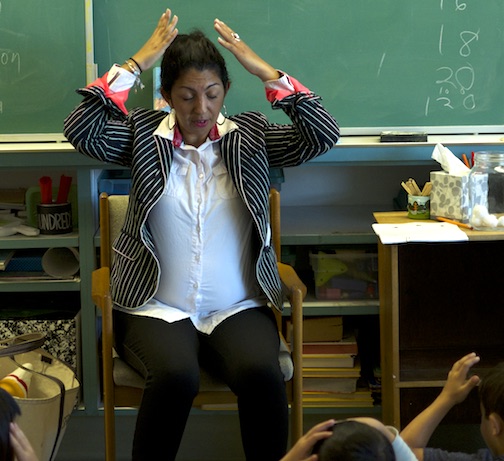 Slap slap, pat pat, clap clap.
Slap slap, pat pat, clap clap.
Roxanna began slapping her hands against her legs. Quickly without any further prompting, the squirmy third graders settled and followed suit. Two slaps on the thighs, two pats on the head, two claps, all the while singing “Never Touch a Gun.” The class repeated the jingle several times before Roxanna moved the children on to discussing when it is, and when it’s not, appropriate to call 911. Roxanna is one of the Prevention Center’s community educators.
This was the final of four classes on safety at Argonne Elementary School. A cornerstone of our work here at the Prevention Center is to teach children how to keep themselves safe. And, it’s quite evident that these children have learned a lot in these short classes. Now, they can quickly recite, “we’re the best at keeping us safe” when asked, “who’s best at keeping you safe?” — something I was never taught. While you and I each have a role in keeping kids safe, it’s essential that kids understand safety and are empowered to protect themselves.
Over the thirty minute lesson Roxanna went on to draw a web of support — a web of “safe” people who the kids could turn to for help. As I listened, I kept thinking about what simple yet important concepts she was articulating. Things I now know intuitively but don’t always think to say outloud to the young people in my life.
During my day at Argonne Elementary I also found out that our educators vary the content for kindergarten – 3rd grade from that of 4th-5th grade to account for the different situations older kids encounter, like cyberbullying.
I learned a lot from our “Safety Lady” (as our educators are known by the kids) so I would like to share their teachings with all of you. Here’s a lesson for you and the young ones in you life:
|
Lesson 1: Personal Safety
Lesson 2: Assertiveness
Lesson 3: Touching Rule
Lesson 4: Systems of Support
|
As we worked our way through the system of support these youngsters have, we enjoyed some smart and some funny questions. Questions like: “what if I don’t like to take a shower?” or “do I call 911 if my brother gets mad at me?” or “sometimes my parents argue.”
I have no doubt that these children — and all the lucky kids who spend time with our educators — will continue singing “Never Touch a Gun” for years to come. I, myself, was caught mumbling the diddy at my desk the other day. Luckily, it was Molly Jardiniano, the jingle creator, who caught me. She told me that she created the hand gestures to accompany the words after attending a workshop on autism and learning that visual indicators are helpful in teaching to autistic kids.
Next time, I’ll go over safety lessons for our 5th and 6th graders.